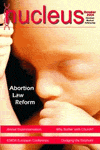If we live in a world that thinks there is no absolute truth and that faith and reason are incompatible how can we convince people that God exists?
Francis Schaeffer was the founder of L’Abri in Switzerland, a study community set up to help people relate Christianity to all aspects of culture. Writing in the 1960s, he addresses the issue of how culture and modern thought have changed in their attitude to truth. He says we have crossed the ‘line of despair’ into a world where the popular opinion is that there is no absolute truth. Like John Stott in The Contemporary Christian (Leicester, IVP 1992) he highlights the need for Christians to understand the culture around them in order to proclaim the gospel effectively.
The book follows this shift in attitudes to truth through the fields of philosophy, art, music, literature, language and finally theology, pointing out the flaws by following it to its logical conclusion. He looks at pioneers in these fields, including Hegel, Picasso, Dylan Thomas, Salvador Dali and Leonard Bernstein. In each case he explores what influenced them, how they put their philosophy into practice in their life and work, and how in turn they influenced culture and popular thought.
Schaeffer seeks to help us understand the concept and implications of having a ‘God who is there’ - not just a figment of our imagination, but actually there! He reminds us how exciting this is and shows that, in contrast to the new philosophy, our view is entirely consistent with what we observe in ourselves and the world around us. He discusses how Christianity is different and how, knowing this, we can communicate it adequately to our culture.
The God Who Is There is quite hard work, and contains some complicated concepts. However, diagrams are used very effectively and the explanations are sufficient to understand what is being said. There are also stories from the author’s experience, and we see his great compassion for people and love for God.
I found this book useful in understanding and tackling the way my friends react to the gospel. I also look at modern art, music and literature in a completely different way! Having said that, even though it was very interesting, I found it heavy going and I’m not sure whether I would have got through it if I hadn’t been reviewing it. However if you have some spare time (and spare brain cells) I would highly recommend it.
Reviewed by:
Sarah Teague
Clinical student
Imperial College, London































